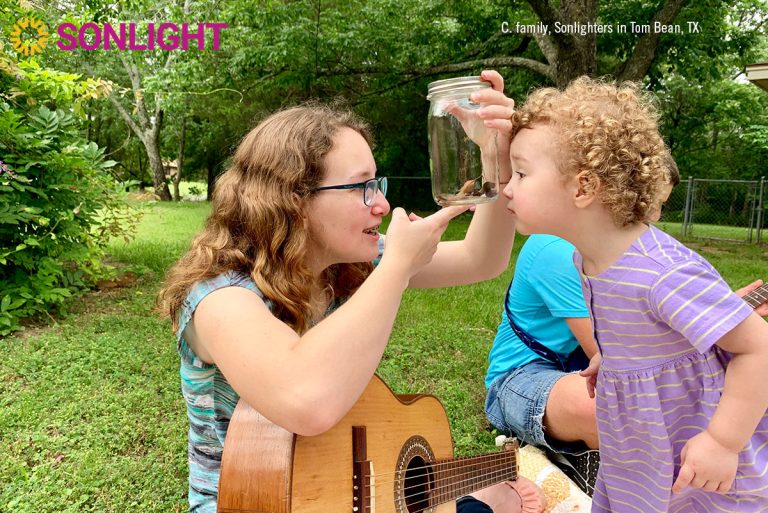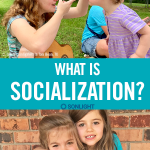
Socialization is a word that we homeschoolers often come to dread, probably because it’s the focus of much criticism for our chosen educational philosophy. There’s probably not a single homeschooler out there who hasn’t heard, “But what about socialization?”
Often, I’ve found myself wondering what would happen if I replied, “What is your definition of socialization?” I have to ponder whether they would even truly know what they were asking me.
Many weeks ago, I was at my son’s basketball game. It was a pretty exciting moment in the game, and I happened to look over at the student section to see what I thought was a peculiar sight. All that I could see from my vantage point was the tops of heads, each one hunched over a personal screen. Occasionally, the teen would share their smart phone with another student for a few seconds, but soon enough, they would go right back to staring at the screen. I doubt most of those students watched even half of the game.
As I looked around, I realized that the adults in the building weren’t faring much better. Many of us were also hunched over our screens, oblivious to the excitement happening around us. I don’t think socialization is a homeschool problem. I think it’s a societal problem that we all need to address. This brings me to the bigger question that we all need to examine: What is socialization?
1. Socialization is Learning Common Courtesies and Social Norms
By Webster’s definition, socialization is “the activity of mixing socially with others” or “the process of learning to behave in a way that is acceptable to society.
Oddly enough, the example sentence in the online dictionary says, “Preschool starts the process of socialization.”
Does it?
I would argue that socialization begins much earlier, and it begins in the home.
- Every time I make eye contact with my new baby, I’m passing on social norms.
- When my toddler snatches a toy from another child and I reprimand the rude behavior, I’m teaching social norms.
- When they demand help, and I require them to repeat their request in question form with a please attached, I’m teaching social norms.
To be quite honest, I would very much dislike the thought that my child has to wait until preschool to be taught socialization skills from a room full of three-year-olds!
On the flip side, a parent who is rude to an elderly person has taught their child that our culture doesn’t value the elderly. A parent who regularly curses their child has taught that child that cursing is part of daily communication.
When we wait for school to allow other children or even other adults to socialize our children, we are basically handing over a God-given, essential task of parenting. We are saying to these youngsters and their teachers, “Hey, whatever set of values you have are probably good enough, so teach those to my child.”
No thank you. Socialization begins at home.
2. Socialization is the Ability to Hold Conversations Across Generations
Socialization is not confined to how good you are at conversing with people in your own age bracket. The definition of socialization is to learn to behave in a way that is acceptable to society. It doesn’t come with any caveat about which demographic of society you have to work with.
We make a huge mistake when we dismiss inter-generational social skills. Wisdom comes from age, and if we don’t draw wisdom from the older generation, then we certainly cannot claim to be socialized. Children need to be able to hold conversation across multiple generations. They need to be as comfortable with a fellow teenager as they are with a elderly woman or a toddler. Being socialized means valuing every life at every stage.

3. Socialization is Becoming a Productive Citizen
We all desire for our children to grow up to be productive citizens. We want our children to be able to get a job and support themselves and their future family. We want them to become leaders within their community, displaying the fruit of the Spirit on a daily basis. With that in mind, it is our job to help our child become a productive citizen, teaching them these skills.
Socialization includes being servant-hearted, asking "How can I help?" This branch of socialization is taught every time you take a casserole to a sick person or every time you volunteer your time for a church or community project. It is taught every time you stop school to pray for someone or to go help your neighbor mow their yard. Socialization is inconveniently pausing your life to make someone else’s better.
4. Socialization is Having the Courage to Be a Stranger in This World
This world is not my home. It’s a line that I repeat to myself often. As Christians, we are simply Pilgrims in a foreign land, passing through and striving to glorify God, while longing for the day that we can truly say, “I’m home.”
Sometimes this world looks so weird to me, and even in the comfort of my own earthly home, I still find myself feeling out of place. So much of what I see playing out in our society is so far from the good work that God began in creation. It’s such a difficult reality at times, holding the tension between living in the world, yet not being of the world. It takes courage.
Socializing our children means teaching them to live in that tension alongside us. It means instilling the courage it takes to stand up for what is right and good, while still loving people well. This is something that public schools can’t teach our children because it is The Gospel. We cannot afford to passively believe that public schools are taking care of this for us because they simply can’t. The only way that this can be taught is by discipling our children in the Word and reminding them of the cost of the cross.
There is no other way to learn to love sinful people, except to daily look in the mirror and take in the gravity of our own, ugly sin, while remembering that we too, have received undeserved grace from a holy God. Any other motivation is simply a display of empty kindness, here today, and gone tomorrow.
So my question to the well-meaning people who ask about socialization becomes, “How could I possibly not socialize my child at home?”
Even parents who send their children to public schools still must take on the responsibility of socialization. We cannot hand over this task to a classroom of our child’s peers. We cannot leave it to teachers. We cannot leave it to social media. It is our task—and our privilege—to socialize our children.
Fellow homeschoolers, socialization isn’t about carting our kids around to a bunch of different activities. It’s about giving them the time and space to live life alongside you. It’s about being intentional about teaching them our beliefs and values. So the next time someone asks you the dreaded question, just smile and say, “Thank you for your genuine concern, but I think we’re doing just fine!”
It's easy to choose your Sonlight curriculum. Use SmoothCourse™ to guide you.









